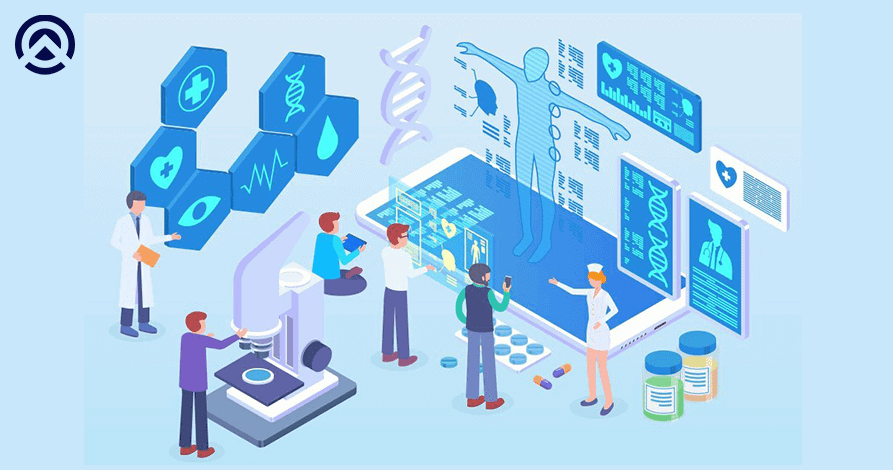Innovation brings out the best when it comes to dealing with technology and its trends. In recent times, people have considered data as the power that can completely transform the process of technical innovations. Every sector is working toward accepting technologies that bring advancement within their operations and services. It comes as no surprise that the healthcare industry also started to reform its services within the landscape of big data. The concept of bigdata within the healthcare industry represents a seismic shift that works to completely revolutionize the current practices.
As it works to reform the current practices of understanding the disease, diagnosing, and treating the medical condition properly. The integration of big data within this industry can result in benefits like early detection of different diseases, effective preventive measures for severe diseases, reduction in the overall cost, new drug research and development, and the formation of personalized medical treatment. The research data by Statista highlights the growing scale of big data-aided technologies in the time span of 2016 to 2025.
 Source: Statista
Source: Statista
The above figure shows the comparative girth measures adding big data solutions within the healthcare sector. These market size measures are divided into three major categories which are clinical analytics, financial analytics, and operations analytics. In the time frame of 2016, all these three categories had market size values of 0.65, 2.38, and 1.6 billion dollars. Whereas targeted future expectations of this big data emergence in 2025 are 4.45, 13.14, and 11.35 respectively. This is a clear indication of the growing nature of big data techniques within the healthcare sector. This also indicates the level of acceptance by the healthcare professionals as well as by the patients.
Blog Highlights
The further sections of this blog will present a specific analysis of big data and its emergence within the healthcare sector. The major highlights of this blog are the advantages of bigdata analytics techniques within the healthcare sector, implementing ways of big data within this sector, and the major challenges arriving in the big data setup.
Integrating Big Data into the Healthcare Domain
The integration of Bigdata in the healthcare sector provides various benefits that result in an extraordinary shift in healthcare operations. In other words, this shift accelerates the process of data collection, management, modification of the information for better patient care, medical research conduction, and improving the overall functioning of this sector.
 Source: Dash et al
Source: Dash et al
The above figure shows the process by which healthcare data can be modified into a smart asset. The data sets can be in the form of sensing data, Electronic Health Records (EHR), Medical imaging, wearable device records, genomic records, clinical data, public health records, and omics data. These collected data within the data warehouse are then analyzed with different big data analytics techniques. Which are descriptive, diagnostic, predictive, and prescriptive while being present in an insight and foresight analytics environment. This results in the final outcomes of smart and effective healthcare decisions. Along with this, the major attributes of integrating big data in patient care are explained further.
1. Volume
Big data in healthcare tends to represent a large scale as it encompasses a large scale of data sets. These data sets can be present in the form of EHRs, genomic data, wearable device data, medical imaging, and other types of data sets. This vastness of the medical data sets represents the essential need for bringing big data into these patient care practices.
2. Variety
The available data sets within the healthcare sector are available in different categories, which are structured data sets like patients’ demographics and clinical records. And unstructured data sets like doctor’s notes, medical images, and social media interactions related to health.
3. Velocity
Healthcare data streams in at an astonishing pace. It flows from multiple sources continuously, including real-time monitoring devices, hospital admissions, and telemedicine consultations. The speed at which data is generated demands swift processing and analysis to extract meaningful insights promptly.
4. Veracity
It is critical in healthcare data, as it pertains to the accuracy and reliability of the information. Ensuring data quality is paramount, as healthcare decisions and patient care depend on the accuracy of the data.
Read more: Chatbots in Healthcare – Advantages, Disadvantages Applications & their Future
Revolutionary Uses of Big Data in the Healthcare Sector
Big data has a potential impact on various operations of the healthcare industry and majorly covers its value chain practices. The high level of acceptance of these innovative practices has completely transformed the working methods of this sector. Big data technologies have made many changes and are classified into three categories of applications. These are as shown in the figure below with low, medium, and category of uses.
 Source: Jha et al., 2022 IEEE
Source: Jha et al., 2022 IEEE
In this category of Big data applications, the higher section capability section involves applications related to call centers, disease management, utilization management, underwriting, and claims administration. This section holds an approximate percentage value of 70% as compared to other applicable sectors but is present in less quantity. In the medium category, the applicative sections are case management, product development, and policy administration. This category holds a percentage criteria of 25% and has a medium-level presence in the marketplace. The lower quality of Big data applications only involves provider management assets having a 5% capability spread. However, this category of applications holds a strong presence in the marketplace. Further, the Big Data applications present in the healthcare industry are explained.
Electronic Health Records
To effectively manage and treat patients, healthcare providers maintain healthcare records precisely. They collect data sets from a variety of informative sources to do so. Big data completely renovates the process of data storage while introducing EHRs. This technique works on saving the patient’s data in electrical form instead of being dependent on paper-based record holders. With the acceptance of this ease, doctors and other medical professionals can access and modify information from anywhere.
Strategic Decision-Making
Accurate decisions can work on saving someone’s life when you are working on healthcare mobile application development. The presence of Big data holds a valuable time within the healthcare sector. These insights have beneficial aspects like making effective decision-making based on past strategies and data analysis of records.
Precision Medicine
This presents the involvement of Artificial Intelligence (AI) with Big data and provides a unique set of services. The development of healthcare applications based on these technologies provides a variety of solutions that are highly advanced in nature and support automation. The main objective of this approach is to provide personalized medicine intakes that fit well according to the condition of the patient at the right time. The integration of AI body scanners results in more accurate decision-making as compared to traditional radiology scanners.
IoT and Healthcare Devices
The technical term, Internet of Things (IoT) has been adopted by Big data-integrated healthcare applications that exist in a wide range. These innovations make sure to help insurance holders, payors, providers, and other key stakeholders. The major applications of IoT and Big data are wearable devices, patient care, smart pills, smart hospitals, and assets for healthcare professionals. Wearable devices work on maintaining a continuous monitoring process with a defined set of key performance indicators. Smart Pills provide the facility of edible electronic devices and work on making the patient’s treatment more effective.
The Advantages of Embracing Big Data in Healthcare

In today’s rapidly enhancing technical world, the development of Big data-integrated healthcare applications is completely revolutionary. This offers different benefits that enhance patient care, drive medical innovations, streamline operations, and make medical research more effective. These advantages are explained further.
Patient Care Advancements
The involvement of big data analytics provides a feature of personalized individual treatment that is beneficial in many ways. With this technique of data analysis, the utilization of genetic information and health history can lead to personalized treatment solutions. In other words, this individual treatment works on making the treatment process more accurate and maximizes the efficacy. Also, this technique makes the identification of different critical diseases possible even in the early stage.
Improved Healthcare Operations
The proper execution of any process demands an accurate allocation of resources. With this technique, patient care can be more efficient while dealing with emergency handling of patients. This provided benefits like higher satisfaction with real-time patient demand, improvements in overall service quality, and reduced waiting time for patients.
Improved Clinical Decision-making
With the integration of evidence-based medicine and optimized treatment, any decision related to the critical health of the patient can be taken effectively. This provides advantages like proper assistance with the treatment plans, dose adjustment, research-involved treatment, and medication management to ensure first-class medical solutions for the patient.
Cost Efficiency
Through optimized healthcare delivery, reduced redundant tests, and prevention of complications, big data contributes to cost reduction while maintaining or enhancing care quality.
Read more: How Blockchain is Advancing The Healthcare Industry in 2023?
Research and Drug Development
Researchers can leverage big data to identify potential drug candidates more rapidly, expediting the drug development process and bringing life-saving medications to market sooner. Big data assists in identifying suitable candidates for clinical trials, resulting in more efficient and cost-effective research.
Critical Conclusion
In the healthcare sector, the integration of big data plays a pivotal role in simplifying the management of patient data for healthcare providers. This approach provides holistic solutions customized to serve a diverse range of healthcare settings. As the demand for efficient and secure patient data management continues to surge, visionary developers and forward-thinking healthcare organizations committed to enhancing patient care through technological innovations are on the rise. Despite the initial challenges often faced in this field, many have successfully emerged as trailblazers in leveraging big data in the healthcare sector. In today’s constantly evolving healthcare landscape, the adoption of intelligent digital solutions has become progressively more accessible, empowering healthcare providers to seamlessly adapt to the evolving requirements of modern healthcare.
Amplework, with its impressive 5+ years of immersive experience, holds a prominent position in the arena of mobile app development within the healthcare sector. Our dedicated team consistently exceeds client expectations, earning a well-deserved reputation for reliability and trustworthiness. We’ve achieved a significant milestone by providing support to various organizations, contributing to a revenue generation of 200 million. We invite you to explore our website to uncover the exceptional healthcare app development services we offer. Partner with Amplework to embark on a transformative journey towards more efficient and secure patient data management, ultimately enhancing the quality of care provided by healthcare professionals.










